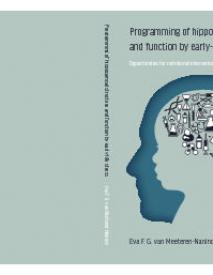Programming of hippocampal structure and function by early-life stress: Opportunities for nutritional intervention
Early-life is a critical developmental phase during which brain structure and function are shaped 'for life'. When early-life is disturbed by stress-exposure, this lastingly programs our brains and is associated with impaired cognition and predisposition to psychopathology in adulthood. Unfortunately, early-life stress (ES) is no exception in society. However, prevention of ES is often not feasible and currently no effective intervention strategies are available to prevent or repair the lasting consequences of ES on mental health. The main goals of this thesis were to: i) gain insight into some of the biological processes involved in brain programming during early-life, when experiences, hormones and nutrition interact, and ii) to test the efficacy of interventions designed on the basis of this knowledge. We concentrated specifically on the effects of chronic ES in mice and on the structure and function of the hippocampus. The findings in this thesis provide evidence for: i) the synergistic action of various critical environmental factors that program the brain during early-life, ii) the existence of both direct and lasting effects of chronic ES on hippocampal structure and function, iii) sex-differences in the vulnerability to ES. Overall, this thesis contributes to a deeper understanding of the processes involved in early programming of the hippocampus. It provides new avenues for research aimed to develop intervention strategies to prevent the lasting consequences of ES on mental health, particularly highlighting the promising role of nutritional intervention. This has high translational value, as nutritional interventions are typically non-invasive, relatively cheap and easily applicable.
Geachte bezoeker,
De informatie die u nu opvraagt, kan door psychotraumanet niet aan u worden getoond. Dit kan verschillende redenen hebben,
waarvan (bescherming van het) auteursrecht de meeste voorkomende is. Wanneer het mogelijk is om u door te verwijzen naar de bron
van deze informatie, dan ziet u hier onder een link naar die plek.
Als er geen link staat, kunt u contact opnemen met de bibliotheek,
die u verder op weg kan helpen.
Met vriendelijke groet,
Het psychotraumanet-team.
Reference:


